Few bands have burned as brightly—or as chaotically—as the Sex Pistols. They weren’t just a punk band; they were a cultural explosion, tearing through the music industry with controversy, raw energy, and an anti-establishment attitude. While many know their biggest moments, some details of their short but intense career remain lesser known. Here are 10 surprising facts about the Sex Pistols you might not have heard before.
1. The Band’s Original Lineup Was Different
Before Sid Vicious became the poster boy for punk rebellion, the Sex Pistols had a different bassist: Glen Matlock. In fact, Matlock was a key songwriter on their only studio album, Never Mind the Bollocks, Here’s the Sex Pistols. He left (or was pushed out) in 1977, reportedly because he liked The Beatles—though he later said it was due to clashes with Johnny Rotten. Sid Vicious, who replaced him, looked the part but wasn’t exactly a skilled musician.
2. The Infamous TV Interview That Changed Everything
The Sex Pistols were already causing a stir, but their appearance on Thames Television’s Today Show in December 1976 made them national villains overnight. Host Bill Grundy, apparently drunk, goaded them into swearing on live TV. Steve Jones fired back with a string of insults, including calling Grundy a “dirty old man.” The incident got them banned from venues across the UK—but also made them the most talked-about band in the country.
3. Sid Vicious Could Barely Play Bass
Sid Vicious had the look, the attitude, and the chaos that defined punk rock. But when it came to playing bass, he struggled. During the recording of Never Mind the Bollocks, most of the bass parts were actually played by Matlock or guitarist Steve Jones. Sid was often too intoxicated to contribute, and by the time of their disastrous U.S. tour, he was barely functioning on stage.
4. They Were Dropped by Multiple Record Labels
The Sex Pistols’ reputation was so toxic that major record labels scrambled to distance themselves. They were first signed by EMI, but after their offensive behavior—including the Grundy interview—the company dropped them. A&M Records picked them up but canceled the deal within a week, even destroying thousands of already-pressed copies of God Save the Queen. Eventually, Virgin Records took a chance on them, releasing their only album in 1977.
5. “God Save the Queen” Was Banned—But Almost Hit #1
The band’s most controversial song, God Save the Queen, was banned from radio and refused placement in many record stores. Despite this, it climbed the UK charts and was widely believed to be the real #1 single, though many suspect chart-rigging prevented it from officially taking the top spot. The song was a direct attack on the monarchy, released during Queen Elizabeth II’s Silver Jubilee, making it one of the most politically charged punk tracks ever.
6. Johnny Rotten’s Real Name and Post-Pistols Career
Before he became Johnny Rotten, he was John Lydon—a shy kid from London with rotten teeth (hence the nickname). After the Sex Pistols imploded, Lydon reinvented himself with Public Image Ltd (PiL), a band that blended post-punk, dub, and experimental rock. While less commercially successful than the Pistols, PiL proved that Lydon was more than just a punk provocateur—he was a true musical innovator.
7. Their U.S. Tour Was a Complete Disaster
By 1978, the Sex Pistols had burned bridges in the UK, so they turned to America. The problem? Their U.S. tour was mostly booked in the Deep South, where their rebellious image wasn’t exactly welcomed. Constant infighting, poor planning, and Sid Vicious’ worsening drug addiction turned the tour into a mess. It all ended in San Francisco, where Johnny Rotten sneered into the mic: “Ever get the feeling you’ve been cheated?”—effectively ending the band on stage.
8. They Weren’t the First British Punk Band
While the Sex Pistols get credit for launching UK punk, they weren’t actually the first British punk band. The Damned beat them to the punch, releasing the first UK punk single, New Rose, in 1976—months before the Pistols’ debut. However, the Sex Pistols’ influence and controversy cemented their place as the face of punk rock, overshadowing many of their contemporaries.
9. They Reunited… for the Money
For a band that once prided itself on anti-establishment ideals, the Sex Pistols’ 1996 reunion tour, Filthy Lucre, was an open admission that they were doing it for the cash. Johnny Rotten was blunt about it, saying, “We’re only in it for the money.” Fans still flocked to see them, proving that their rebellious legacy had staying power—even if the band itself had changed its tune.
10. Their Influence Goes Beyond Punk
Despite their short-lived career, the Sex Pistols shaped music far beyond punk rock. Bands from Nirvana to Green Day and even hip-hop artists have cited them as an influence. Their DIY ethos and raw energy changed the way artists approached music, making them one of the most influential bands of all time—even if they only released one album.
